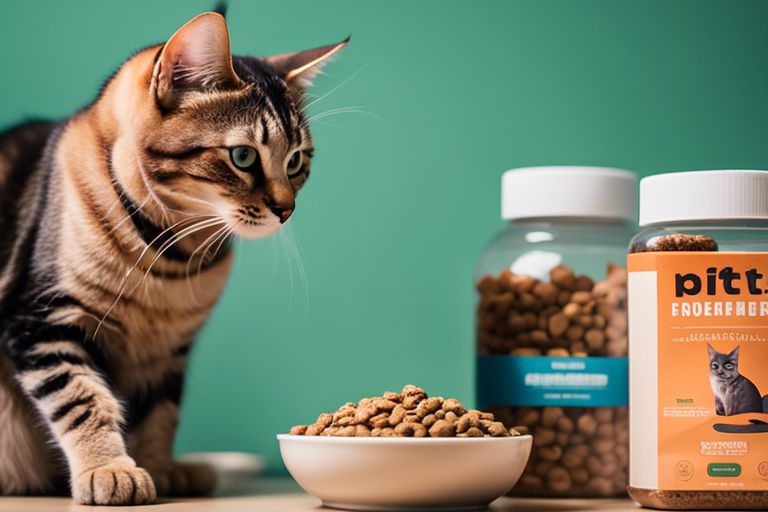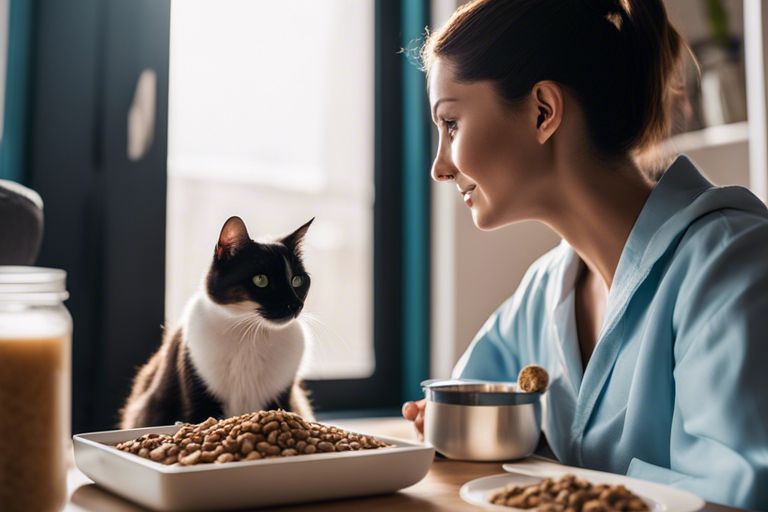If your feline companion is experiencing digestive issues, you may be feeling concerned and eager to help. Fortunately, there are several steps you can take to assist your cat in overcoming these issues and improving their overall digestive health. Whether your cat is suffering from diarrhea, constipation, vomiting, or lack of appetite, it’s essential to address the problem promptly to prevent further complications. In this blog post, we will discuss various strategies and solutions to help your cat find relief and maintain a healthy digestive system. By incorporating these tips into your cat’s care routine, you can alleviate their discomfort and improve their quality of life.
Key Takeaways:
- Consult a veterinarian: If you suspect your cat is having digestive issues, it’s important to seek professional advice from a veterinarian to properly diagnose the problem.
- Provide a balanced diet: Ensure your cat is receiving a high-quality, balanced diet that is easily digestible and meets their nutritional needs.
- Consider specialized food: Your veterinarian may recommend a specialized diet that is formulated to support digestive health, such as a prescription or over-the-counter gastrointestinal formula.
- Monitor feeding habits: Pay attention to your cat’s eating habits and make sure they are eating at regular intervals, avoiding overeating, and responding positively to their food.
- Manage stress: Stress can exacerbate digestive issues in cats, so it’s important to create a calm and stress-free environment for your feline friend.
Dietary Changes for Improved Digestion
Obviously, dietary changes can play a significant role in improving your cat’s digestive health. By making some adjustments to your cat’s diet, you can help alleviate digestive issues and promote a healthier gut. In this chapter, we will discuss the dietary changes you can make to support your cat’s digestive system.
Selecting the Right Food for Your Cat
When it comes to selecting the right food for your cat, you should prioritize high-quality, easily digestible proteins. Look for commercial cat foods that list meat as the first ingredient and avoid those with excessive fillers and artificial additives. Additionally, consider switching to a specialized digestive care formula that contains added probiotics and prebiotics to promote a healthy gut flora. This can help improve digestion and reduce the likelihood of digestive issues.
Importance of Hydration in Feline Digestion
Hydration is crucial for maintaining your cat’s digestive health. Ensure that your cat has easy access to fresh, clean water at all times. You can also consider incorporating wet food into your cat’s diet, as it contains a higher moisture content than dry kibble and can help keep your cat hydrated. Adequate hydration is essential for proper digestion and helps prevent issues such as constipation and urinary tract problems.
Probiotics and Supplements
Assuming you have consulted with your veterinarian and obtained their approval, probiotics and supplements can be valuable tools in helping your cat’s digestive issues. Probiotics are beneficial bacteria that can aid in digestion and support a healthy gut environment. Supplements, on the other hand, can provide additional nutrients and support overall digestive health.
The Role of Probiotics in a Cat’s Digestive System
Probiotics play a crucial role in maintaining a healthy balance of gut flora in your cat’s digestive system. These beneficial bacteria can help improve the overall gastrointestinal function, aid in the digestion of food, and promote the absorption of nutrients. By introducing probiotics into your cat’s diet, you can help restore the balance of the gut microbiota, reduce inflammation, and alleviate digestive discomfort.
Supplements That Support Digestive Health
When it comes to supporting your cat’s digestive health, there are various supplements available that can provide essential nutrients and promote overall gastrointestinal function. For example, digestive enzymes can help break down food and enhance nutrient absorption, while fiber supplements can aid in regulating bowel movements and supporting digestive regularity. Additionally, omega-3 fatty acids can reduce inflammation in the gut and promote a healthy digestive system.
Home Care and Remedies
Now, when it comes to helping your cat with digestive issues at home, there are a few remedies and practices you can try. One option is to explore natural remedies for cat digestion, such as probiotics, digestive enzymes, and herbal supplements. You can learn more about these natural remedies for cat digestion in this Natural Remedies for Cat Digestion blog post.
Creating a Stress-free Environment
If your cat is experiencing digestive issues, it’s important to create a stress-free environment for them. Stress can worsen digestive problems in cats, so it’s essential to provide a calm and soothing space. This can involve providing a quiet area for your cat to rest, minimizing loud noises, and keeping their living space clean and comfortable. By reducing stress, you can help improve your cat’s digestive health.
Natural Remedies and Gentle Treatments
When addressing your cat’s digestive issues, you may want to consider natural remedies and gentle treatments. For example, providing your cat with a balanced diet that includes high-quality, easily digestible food can make a significant difference. Additionally, you can explore natural supplements and gentle treatments, such as herbal remedies and probiotics, to support your cat’s digestive system. These gentle approaches can help soothe your cat’s digestive issues without harsh medications or interventions.
In caring for your cat’s digestive issues at home, it’s essential to create a stress-free environment to promote healing. Additionally, exploring natural remedies and gentle treatments can provide relief for your cat without harsh medications or interventions. By addressing their digestive issues with a holistic approach, you can support your cat’s overall well-being and digestive health. Remember to consult with your veterinarian before making any changes to your cat’s diet or treatment plan. It’s important to prioritize your cat’s comfort and well-being while seeking home care and remedies for their digestive issues.
When to Consult a Veterinarian
To effectively manage your cat’s digestive issues, it’s important to know when to seek professional help. While minor digestive upsets can often be managed at home, there are certain signs that indicate a visit to the vet is necessary. You should consult a veterinarian if your cat’s digestive issues persist for more than a few days, or if they are accompanied by other concerning symptoms such as weight loss, dehydration, or lethargy. Additionally, if your cat is vomiting or experiencing diarrhea frequently, it’s critical to seek professional advice. Trust your instincts and don’t hesitate to reach out to a veterinarian if you have any concerns about your cat’s digestive health.
Identifying Severe Digestive Ailments
If you notice blood in your cat’s vomit or diarrhea, it’s a clear sign that something serious is going on with their digestive system. Severe abdominal pain, bloating, or a distended abdomen are also red flags that should not be ignored. These symptoms could indicate a potentially life-threatening condition such as intestinal obstruction, pancreatitis, or a gastrointestinal ulcer. If you observe any of these signs, it’s crucial to seek immediate veterinary care for your cat.
Understanding Diagnostic and Treatment Options
When you take your cat to the vet for digestive issues, they will likely perform a thorough physical examination and may recommend diagnostic tests such as blood work, x-rays, or ultrasound to identify the underlying cause of the problem. Once a diagnosis is made, your vet may recommend dietary changes, medication, or in severe cases, surgery to address your cat’s digestive issues. It’s important to follow your vet’s recommendations closely and to communicate any changes or concerns regarding your cat’s condition. With proper diagnosis and treatment, many digestive problems in cats can be effectively managed and resolved.

Conclusion
To wrap up, helping your cat with digestive issues involves making some simple changes to its diet, lifestyle, and environment. By gradually transitioning to a high-quality, easily digestible cat food, ensuring your cat has access to fresh water, and incorporating some natural supplements like probiotics, you can aid in improving your cat’s digestive health. Furthermore, promoting regular exercise, managing stress, and providing a calm, stress-free environment can also play a key role in supporting your cat’s digestive system. Remember to consult with your veterinarian if your cat continues to experience digestive issues, as they can provide further guidance and potential treatment options. With some thoughtful adjustments and proper care, you can help your cat thrive and maintain optimal digestive health.
FAQ
Q: What are common signs of digestive issues in cats?
A: Common signs of digestive issues in cats include vomiting, diarrhea, constipation, loss of appetite, weight loss, and lethargy. If you notice any of these symptoms in your cat, it’s important to consult with a veterinarian for proper diagnosis and treatment.
Q: How can I help my cat with digestive issues at home?
A: To help your cat with digestive issues at home, you can try feeding them a bland diet of boiled chicken or white fish with plain white rice. Make sure they have access to plenty of fresh water. You can also offer probiotics or digestive supplements specifically formulated for cats. However, it’s important to consult with a veterinarian before making any changes to your cat’s diet or giving them supplements.
Q: When should I seek veterinary care for my cat’s digestive issues?
A: You should seek veterinary care for your cat’s digestive issues if the symptoms persist for more than 24 hours, if your cat is showing signs of distress or pain, if there is blood in the vomit or stool, or if your cat is unable to keep any food or water down. Digestive issues in cats can be caused by a variety of underlying health conditions, so it’s important to have your cat evaluated by a veterinarian for proper diagnosis and treatment.

Jayley, a devoted cat enthusiast, also writer for other cat blog as well. She aims to dedicated to providing comprehensive information, insights, and advice on everything you’d ever want to know about our whiskered companions.
